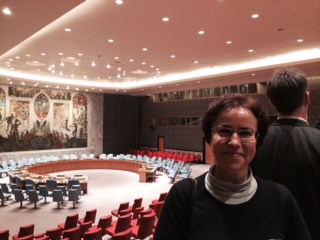
M.Elisa Rech holds a degree in modern languages and has been the head of the FAO Terminology Unit since 2013. She speaks English, Spanish, French, Italian and a little Arabic and has worked in the field of terminology since the beginning of her career at FAO, in 1989, taking over progressively higher duties. These duties ranged from the selection of translators, contractual work and translation revision to the provision of references and training of newcomers, as well as the participation in the design and testing of the different databases used in the Meeting Programming and Documentation Service. She is also the reference point for the terminology partnerships arranged by FAO with other organizations and universities and participates in the International Annual Meeting on Computer-Assisted Translation and Terminology (JIAMCATT).
 a. How did you first become interested in terminology?
a. How did you first become interested in terminology?
I have a degree in languages and the characteristics of each language were always a matter of great interest to me as a means to acquire knowledge. In particular, I remember reading Moby Dick by Melville and the frustration I experienced at not being able to understand all the parts of a ship, even when I thought I had a good command of English. Therefore, after an initial start as an English teacher at a school and some translation work, when I received a proposal to be part of a project for the digitalization of the FAO terminology, I gladly accepted of it, because I saw this task as closely connected with my studies, even though I was not completely sure about what it implied at the time.
b. Why have you decided to start your professional career in FAO?
I thought that a multilingual organization would be the natural outlet for my education and interests. Furthermore, I came from an agricultural background and saw this organization as the perfect combination of all the threads I had followed in my life till then, including some volunteer work with immigrants.
c. How would you describe the progress in terminology since you started your professional career at FAO?
In my group, we moved from terminology cards to computers and then databases with more and more advanced technology behind them. We have developed a Terminology Portal, which is freely available on the internet and allows for additional functions, such as a workflow, besides import and export capabilities. Cooperation has also expanded: from creating an internal tool for translators we grew into projects with the other FAO departments, as well as with other international organizations, adding complexity and credibility to our work. The Portal has become the standard tool for all the Rome-based UN agencies and it is available in Arabic, Chinese, English, French, Russian, Spanish and Latin for scientific terms.
d. How important do you think terminological research is for a translator, especially when working on technical and specialized texts?
In an international organization like FAO, the areas of work range from fisheries to forestry, agriculture, nutrition, phytosanitary measures, etc. and the specialized texts we translate often require careful research of the technical terms to be carried out by the translators. Just think of all the standards, manuals and the codes of conduct published by FAO, where the misunderstanding of a concept would produce a wrong interpretation of the standard or code itself. Also, we are a knowledge-based organization and that implies that correct terminology is to be used, if we wish to produce the right impact with the people and the countries we work with. If we speak about plants, for instance, the same concept can be expressed with different terms, in the same language, moving from Spain to Latin America. The same applies to the names of fish, where numerous synonyms are used all over the world for the same species, but are not exchangeable or understood locally.
e. In your opinion, which disciplines produce the largest number of neologisms nowadays?
Apart from the information and communication fields, where neologisms are continuous and evident also for non-linguists, we are seeing an unprecedented range of changes and new approaches in every field of human activity, and that affects the way we speak and write about each FAO area. Just think of concepts such as “blue growth”, “urban agriculture”, “vulnerable marine ecosystem”, “nanoplastics”, that are currently found in fields of activity, such as agriculture and fisheries, which we tend to think are traditional and well-established in their terminology.
f. What has been your biggest challenge working with terminology?
Consistency and wide dissemination of the correct terminology among users was and sometimes still is an issue. Different language equivalents emerge in the documents and departments of FAO and then progress in parallel, which can mean it is difficult to harmonize them when they have already been used in many documents and web sites for some time. New staff join us every month and it is a challenge to inform all of them about the availability and use of our terminology database, which should also keep up with technical innovation and new demands for interoperability. Furthermore, due to the general lack of human resources, it is difficult to browse all FAO published material in order to remain up to date with the specific terminology of all our activities. Therefore, we try to rotate the subjects we deal with each year so as to update all fields.
g. The Terminology Coordination Unit of the European Parliament manages IATE, the EU’s terminology database. Do you use IATE on a regular basis?
Yes, I do for some of the languages we work with. However, IATE does not cover Arabic, Chinese and Russian, the languages for which we are currently receiving more pressure work-wise, due to the gap with the other FAO languages.
h. What do you think are the main differences between the FAO Term Portal and IATE, not just from a structural point of view but also as far as content is concerned?
Apart from the languages we deal with, I am not aware of big differences in the substance. The same attributes of definitions, remarks and context can be found in both databases, but the process of creation and validation of data is different, as we are a smaller group.
i. TermCoord has recently launched the Mare fisheries terminology project: http://termcoord.eu/terminology-without-borders/yourterm-mare/
and the FAO deals with a large number of subjects in all the FAO languages, including fisheries.- What could you tell us about the FAO glossaries about fisheries?
The FAO Term Portal hosts three specialized collections dealing with fisheries: Aquatic Species, Aquaculture and Fisheries, besides the titles and the general terminology contained in FAOTERM, the largest terminology collection of the Portal. The three collections are the result of a close and successful collaboration with the relevant technical divisions of FAO. In fact, they reflect an ideal scenario for terminology work: linguists working together with the experts in that field.
– TermCoord cooperates with external bodies. How do you think TermCoord could work with FAO for standardization and communication in this field of study, or in others?
A lack of internal resources is pushing all organizations towards increased cooperation, at least in fields of common interest. We have already signed a number of Letters of Agreement with various organizations for provision or exchange of terminology and I would like to remind you that the FAO Term Portal also hosts the terminology of the World Food Programme (WFP) and the International Fund for Agricultural Development (IFAD), and the two other Rome-based UN agencies. Therefore, cooperation is indeed welcome and necessary in order to avoid duplication of effort in a field that is time-consuming and not always recognized at managerial level when it comes to allocation of funds.
Written by Noelia Soledad Pavin – Terminology Trainee at the Terminology Coordination Unit of the European Parliament (Luxembourg). She holds a Master Degree in Lexicology, Multilingual Terminology and Translation from the University Lumière Lyon II, France.
